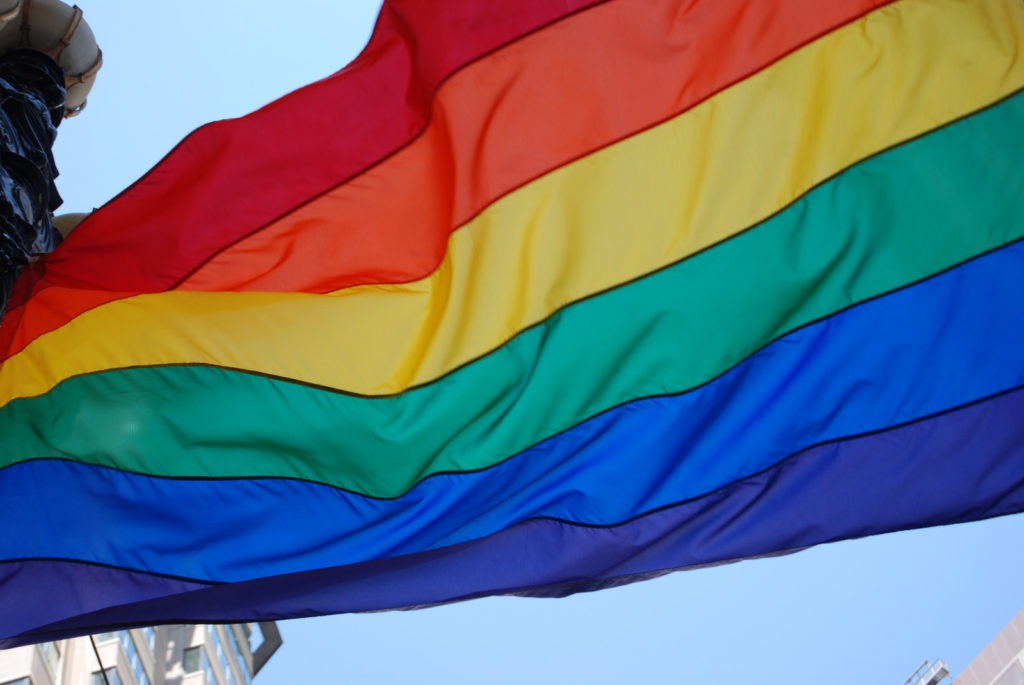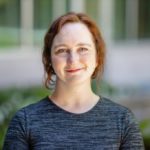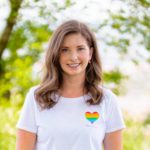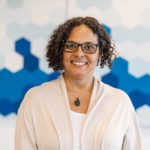
Pride was the first time in my life “I felt free to be me”
*This post was originally published in 2020 and has been updated.
Connecting with our Two-Spirit and LGBTQ+ colleagues is a simple yet meaningful way of showing support, educating ourselves and sparking action. As Pride month winds down, we asked a few of our colleagues to share their thoughts on the celebration of Pride, what makes a good ally, and role models who continue to inspire.
 Suzanne Todd-Kane (She/Her)
Suzanne Todd-Kane (She/Her)
Palliative Care & Emergency Department
Describe your first Pride celebration and what it meant to you.
My first Pride celebration was my senior year of high school, over 10 years ago. My home city did not have any sort of Pride celebration then, so my friends and I traveled to Toronto for their annual Pride Parade. It was loud and crowded and overwhelming, and it was extremely validating at the time.
How can someone be a good ally?
Being an ally is continuous learning, action and reflection. The foundation of good allyship is to put in the work of learning, and not necessarily relying on folks who are already dealing with oppression to also be teaching you. Listening to folks who are taking the time to give you feedback, and then putting that feedback into action, is important. When participating in collective action, making sure to center the voices of those who are most affected. And finally, remembering that no community is completely homogenous. The Two-Spirit and LGBTQ communities are vast and varied. We come from many different social locations and one voice does not speak for all of us. My experience as a white, cisgender queer woman is an extremely privileged one, and there are many other important stories and experiences within our communities.
Who are/were your role models and why?
As a former community social worker, I know so many Two-Spirit and LGBTQ activists who are amazing role models! Hamilton is lucky to have many talented and passionate people who are running cool programs and organizing community events. We especially have a ton of youth talent who inspire me.
How will you be celebrating Pride in absence of large-scale community events?
I’ll be passing down the spirit of Pride to my six-year-old, teaching him about the roots of Pride as a riot, and how it was started by a Black trans woman. While we aren’t able to attend protests just yet, we will be learning about the Black Lives Matter movement and how it connects and intersects with Pride.
 Ash Nong (She/Her)
Ash Nong (She/Her)
Organizational Development Specialist
Describe your first Pride celebration and what it meant to you.
My first Pride experience was 2005 in Toronto, and during that time I was only out to a few people. I would describe my experience as being: seen, heard, safe and valid. It was one of the first times in my life where I felt free to be me.
How can someone be a good ally?
Listen deeply, mirror our language, and believe us when we share our lived experiences. Honour the diverse needs of LGBTQ2S+ people and include us in decisions that impact us. Learn how equity-seeking people are pushed to the margins and how you can support – I highly recommend the works of Audre Lorde and bell hooks. I also invite you to have the courage to speak up and act – through action we can enable individual and structural change. As Viola Davis says, “A revolution has many lanes…just keep your foot on the gas.”
Who are/were your role models and why?
There are two phenomenal women I want to acknowledge personally and professionally.
My personal role model was my childhood neighbour, Ludmila. She was a physician who fled the concentration camps in Germany, immigrated to Canada, and like many internationally educated doctors was no longer able to practice, and yet she still persisted. Ludmila was a leader who always uplifted others and prioritized the importance of developing self – her mantra was, “knowledge is power”. In my first year of university and her last year of life, she paid it forward by investing in my education.
My role model professionally is Jane Hastie, a principled ally known to many at HHS. Jane is the person who always goes to bat for the underdog. As a queer professional entering the healthcare sector, she made me feel included, respected, and deeply valued. To this day, I continue to seek mentorship from Jane. We all need a Jane Hastie in our lives.
How will you be celebrating Pride in absence of large-scale community events?
My partner and I started Pride by raising our flag. We will have virtual celebrations with our friends, engage in online Pride events, and continue to be proud to exist, especially during a time of unrest for BIPOC in and beyond the LGBTQ2S+ community. During Pride month, it is also a time for deep reflection, notably how connected we are to our past and present – as the history of Pride began with protests against police violence, led by Black and Brown trans women, Marsha P. Johnson and Sylvia Rivera.

Tina (Tee) Garnett (She/They)
June 2021 update: Since the time this story was originally published, Tee Garnett has become the Executive Lead and Strategic Advisor, Equity, Diversity and Inclusion (EDI) at SickKids Hospital in Toronto. In this SickKids spotlight, they share their perspective on identity and the need to transform health-care systems to authentically reflect the communities they serve.
Describe your first Pride celebration and what it meant to you.
I was 21, living in London, Ontario, and went to a Pride celebration in Toronto with friends. I was in awe at the ethnic diversity of people – not the stereotypes I had learned about – and was struck by a sense of the human love shared between gay and straight people. I learned that there was not one way to be gay, including being Black and gay.
How can someone be a good ally?
Ally is a verb meaning action. They need to start by identifying their own social political power and privilege, and encourage others like them to do the same so that they will have the confidence to challenge the community and systemic privilege they benefit from, as opposed to relying on those oppressed to prove it, survive it and eradicate it.
Who are/were your role models and why?
Nelson Mandela, and his ability to forgive. Angela Davis, and her commitment to human liberation.
How will you be celebrating Pride in absence of large-scale community events?
I’ll be having a virtual Blackorama dance party with my community, and taking part in online celebratory events.
